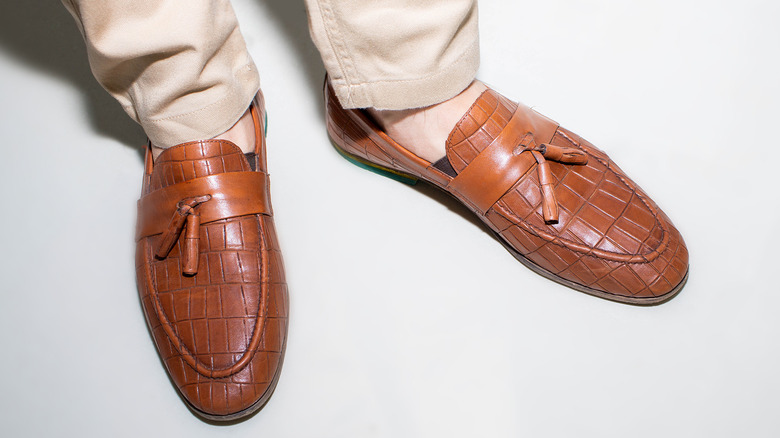Sneaky Causes Of Body Odor That May Surprise You
Body odor is one of those things that we don't like to think about, but it happens to all of us at one time or another. To make matters worse, we can become nose blind to our own body odor — which may be good news for our noses, but bad news for other noses around us (via Reader's Digest).
You might think that sweat is the culprit for the stench coming from your armpits, but that's only part of it. The scientific reason why sweat sometimes stinks is because it comes into contact with the bacteria that lives on your skin. But you don't have to sweat a lot to have body odor, and you can also sweat plenty and not put off a bad smell. Cleveland Clinic explains that many things affect the smell of body odor. While it's normal to be a bit stinky after a serious workout, there are other sneaky reasons for strange body odors, and some of them might surprise you.
Too much stress
When you're stressed out, lots of things are going on with your body. Healthline explains that your body releases hormones that include cortisol and adrenaline when you feel stress. You also sweat under stress, and that is where odor comes into play. Believe it or not, stress sweat smells different from regular perspiration.
The main reason is when you sweat due to hot temperatures, the sweat comes from your eccrine sweat glands, and is comprised mainly of water, salt, and lipids. Stress-related sweat, however, comes from apocrine sweat glands, which are larger than eccrine glands. The sweat from apocrine glands is thicker than sweat from eccrine glands, containing more lipids as well as proteins. When apocrine sweat mixes with the bacteria on your skin, it creates a particular odor.
One way to help manage stress sweat is to practice stress-relieving activities, such as deep breathing or listening to calming music. You can also wear antiperspirant, and bathe daily to help control the odor (via Healthline).
Too few carbs
A low-carb diet, known as keto, helps some people drop weight, but it could also cause body odor. When you reduce the amount of carbs you eat, you are changing what your body uses for fuel. The aim of keto is to put your body in a state of ketosis, so your body uses fat instead of carbs for energy. As the fat is broken down, it releases ketones in your blood. Ketones are a kind of acetone, and can release what Livestrong explains as a "distinctive fruity smell" through your breath and sweat.
One way to combat keto breath is to cut back on protein, or by switching out the types of proteins you eat every week (per Greatist). You can also increase your fat intake or add a few more carbs to your diet. Finally, drinking more water and brushing and flossing your teeth every day could help by getting rid of unwanted bacteria.
Certain foods and drinks
You are probably already aware that some foods like onions and garlic might change your breath, but there are other foods and beverages that alter your body odor for the worse. Well+Good reports on some of the biggest culprits: Scallops and leeks, as well as garlic and onions, are allium vegetables, which contain sulfur. Cruciferous vegetables such as broccoli, cauliflower, and Brussels sprouts also contain sulfur, and sulfur can create some potent body odor. Hot spices like cayenne, cumin, and horseradish change your how you smell because they make you sweat. Just because these foods change your body odor doesn't mean you should stop eating them, but it's good to be aware that these changes happen so you can prepare.
Alcohol can also change the way you smell. Well+Good notes that because alcohol is a toxin, the body works to release any way it can, meaning it will secrete it through your pores, breath, and urine. This process, called oxidation, is your body breaking down the alcohol, and the best way to avoid these kinds of smells is to either not drink or to shower after a night of heavy drinking.
Medical conditions and hormonal changes
Sometimes, a health-related issue can cause body odor. Cleveland Clinic reports that gout, an overactive thyroid, kidney disease, and some infectious conditions all have the potential to change how your body smells. Diabetes-related ketoacidosis can cause odors much like what people on the keto diet experience.
Hormonal changes can also cause your body odor to change or become worse. Women going through menopause experience hot flashes, night sweats, and changing hormones. Likewise, pregnancy and menstruation can cause similar changes, which can create a strong body odor.
The best way to alleviate these kinds of odors is to stay on top of them. You can use antibacterial soap when showering, wear loose cotton garments that allow your skin to breathe, or opt for clothing that wicks moisture away from skin. Antiperspirants can also help, drawing sweat back into your sweat glands, which in turn prevents your body from producing more sweat.
Skipping socks
It's nice to go barefoot, but when you choose to do so while wearing closed-toe shoes, you run the risk of developing some foot odor — especially if it's warm outside. Your feet contain about 125,000 sweat glands each, according to Medical News Today. In fact, that's more than any other part of the body. Socks absorb sweat, so when you wear shoes without them, you are giving sweat and bacteria the perfect, moist climate to create some serious stink. This odor can be magnified if you are one of the 5% of the population that experiences hyperhidrosis, which is a condition that causes excessive foot sweat.
One of the best ways to manage sweaty feet is to wear socks. Look for socks that allow ventilation or draw moisture away from the skin. You might also look at insoles that are made to absorb odor and sweat, or using anti-fungal powders.






